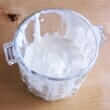Background
- Kefir is a probiotic drink produced by adding kefir grains to milk and allowing it to ferment. Kefir grains are a mixture of bacteria, yeast, and polysaccharides. It is popular in many parts of the Middle East. It is believed that the word "kefir" means "feel good" in Turkish, or that it derives from kopur, meaning "milk," "froth," or "foam." Kefir typically has a tart and refreshing flavor, is slightly carbonated because of the naturally occurring carbon dioxide, and is somewhat thicker than milk. The flavor is described as sour, rich, and creamy. Natural kefir is not sweet, although it may be flavored with fruit.
- Kefir is believed to be more nutritious and therapeutic than yogurt, supplying complete protein, essential minerals, and valuable B vitamins. The belief is that probiotic bacteria in kefir partially digest many milk proteins, making it more easily utilized by the body than other dairy products. At this time, high-quality human trials supporting the use of kefir for any indication are lacking. Better-designed clinical trials are needed before conclusions may be made regarding taking this product for any health condition.
References
- Agarwal KN, Bhasin SK. Feasibility studies to control acute diarrhoea in children by feeding fermented milk preparations Actimel and Indian Dahi. Eur J Clin Nutr 2002;56 Suppl 4:S56-S59. View Abstract
- Can G, Topuz E, Derin D, et al. Effect of kefir on the quality of life of patients being treated for colorectal cancer. Oncol Nurs Forum 2009 Nov;36(6):E335-42. View Abstract
- Ebringer L, Ferencik M, Krajcovic J. Beneficial health effects of milk and fermented dairy products--review. Folia Microbiol (Praha) 2008;53(5):378-394. View Abstract
- Figler M, Mozsik G, Schaffer B, et al. Effect of special Hungarian probiotic kefir on faecal microflora. World J Gastroenterol 2006;12(7):1129-1132. View Abstract
- Forssen KM, Jagerstad MI, Wigertz K, et al. Folates and dairy products: a critical update. J Am Coll Nutr 2000;19(2 Suppl):100S-110S. View Abstract
- Gulmez M, Guven A. Survival of Escherichia coli O157:H7, Listeria monocytogenes 4b and Yersinia enterocolitica O3 in different yogurt and kefir combinations as prefermentation contaminant. J Appl Microbiol 2003;95(3):631-636. View Abstract
- Hertzler SR, Clancy SM. Kefir improves lactose digestion and tolerance in adults with lactose maldigestion. J Am Diet Assoc 2003;103(5):582-587. View Abstract
- Narva M, Nevala R, Poussa T, et al. The effect of Lactobacillus helveticus fermented milk on acute changes in calcium metabolism in postmenopausal women. Eur J Nutr 2004;43(2):61-68. View Abstract
- Nichols AW. Probiotics and athletic performance: a systematic review. Curr Sports Med Rep 2007;6(4):269-273. View Abstract
- Oleinichenko EV, Mitrokhin SD, Nonikov VE, et al. [Effectiveness of acipole in prevention of enteric dysbacteriosis due to antibacterial therapy]. Antibiot Khimioter 1999;44(1):23-25. View Abstract
- Ostman EM, Liljeberg Elmstahl HG, Bjorck IM. Inconsistency between glycemic and insulinemic responses to regular and fermented milk products. Am J Clin Nutr 2001;74(1):96-100. View Abstract
- Santos A, San Mauro M, Sanchez A, et al. The antimicrobial properties of different strains of Lactobacillus spp. isolated from kefir. Syst Appl Microbiol 2003;26(3):434-437. View Abstract
- St Onge MP, Farnworth ER, Savard T, et al. Kefir consumption does not alter plasma lipid levels or cholesterol fractional synthesis rates relative to milk in hyperlipidemic men: a randomized controlled trial [ISRCTN10820810]. BMC Complement Altern Med 2002;2(1):1. View Abstract
- Studd C. Probiotic containing fermented milk supplement may improve the institution of early enteral nutrition. Crit Care Med 2000;28(4):1255-1256. View Abstract
- Topuz E, Derin D, Can G, et al. Effect of oral administration of kefir on serum proinflammatory cytokines on 5-FU induced oral mucositis in patients with colorectal cancer. Invest New Drugs 2008;26(6):567-572. View Abstract







